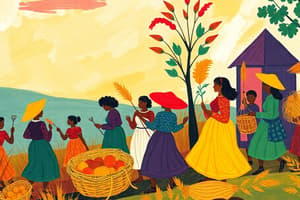Podcast
Questions and Answers
What is one of the key roles of festivals in exploring different cultures?
What is one of the key roles of festivals in exploring different cultures?
- Conducting scientific research
- Creating connections and shaping experiences (correct)
- Exploring outer space
- Promoting technological advancements
What aspect of festivals helps in understanding a community's unique customs and practices?
What aspect of festivals helps in understanding a community's unique customs and practices?
- Delectable cuisine
- Colorful processions (correct)
- Traditional music
- Dance performances
How do words contribute to the significance of festivals according to the text?
How do words contribute to the significance of festivals according to the text?
- They create linguistic boundaries
- They are used for scientific experiments
- They transcend linguistic boundaries and provide insights into human nature (correct)
- They limit cultural understanding
What do traditions do in relation to festivals?
What do traditions do in relation to festivals?
What is the Latin origin of the term 'festival' mentioned in the text?
What is the Latin origin of the term 'festival' mentioned in the text?
Apart from colorful processions, what else characterizes festivals mentioned in the text?
Apart from colorful processions, what else characterizes festivals mentioned in the text?
What is the main purpose of festivals as mentioned in the text?
What is the main purpose of festivals as mentioned in the text?
Which festival symbolizes victory over darkness and the triumph of righteousness?
Which festival symbolizes victory over darkness and the triumph of righteousness?
What cultural narrative is preserved by Diwali according to the text?
What cultural narrative is preserved by Diwali according to the text?
What belief from ancient China is still practiced during Chinese New Year celebrations?
What belief from ancient China is still practiced during Chinese New Year celebrations?
What does Chinese New Year mostly revolve around?
What does Chinese New Year mostly revolve around?
How do festivals help enrich individuals culturally according to the conclusion in the text?
How do festivals help enrich individuals culturally according to the conclusion in the text?
Flashcards are hidden until you start studying
Study Notes
Words: Exploring the Cultural Significance of Festivals
Introduction
Words have the power to convey meaning, create connections, and shape experiences. When it comes to understanding different cultures across the globe, festivals serve as an incredible avenue for exploration. Through these vibrant celebrations, we delve deeper into the heart of a community, discovering unique customs, practices, and shared histories. Today, let's embark on a fascinating journey where we examine the significance of words within the context of festivals.
The Universal Language of Festivals
From Diwali in India to Carnival in Brazil, each festival presents a distinct narrative that reflects the essence of a given culture. These events are often characterized by colorful processions, traditional music, dance performances, and delectable cuisine. However, behind these surface elements lies a deeper meaning that transcends linguistic boundaries. By observing how words are woven into the fabric of these festivals, we can gain valuable insights into human nature and societal values.
Words and Tradition
Traditions play an integral role in shaping our perception of festivals. They are passed down through generations, creating a sense of continuity and belonging within communities. Within this framework, words hold immense power as they encapsulate the collective wisdom of our ancestors. Consider the term 'festival', itself rooted in Latin ('feriae') meaning holidays, leisure, or freedom from work. This etymology speaks volumes about the purpose behind festivals; they offer moments of respite from daily routines, allowing people to come together in celebration.
Festivals as Cultural Storytellers
Festivals often act as living histories, preserving cultural narratives through rituals, mythologies, and shared experiences. Take Diwali, the Hindu festival of lights, for instance. The story goes that evil demon King Ravana kidnapped Lord Rama's wife Sita, prompting Rama to embark on a ten-year exile in pursuit of justice. Upon returning victorious, the people lit oil lamps to illuminate their pathways, welcoming their beloved king home. Today, Diwali continues to symbolize victory over darkness (evil) and the triumph of righteousness.
Similarly, Chinese New Year celebrations revolve around family reunions and embracing new beginnings. In ancient China, it was believed that washing away old clothes and sweeping floors before the first day of the new year brought good fortune. These practices still persist today, illustrating how deep-seated traditions remain embedded within modern festivals.
Conclusion
As we delve deeper into the world of festivals, we discover that each word holds a universe of nuance and significance. Whether it's the joyful shouts of 'Happy New Year!' during Chinese New Year or the melodious chants of 'Jai Shri Krishna!' during Holi, these expressions reveal much about our collective humanity. By exploring the stories, symbols, and emotions associated with festivals, we enrich ourselves culturally while fostering greater empathy towards diverse communities around the globe. So let us cherish these vibrant occasions, knowing full well that each word spoken carries with it a rich tapestry of tradition, wisdom, and hope for a brighter tomorrow.
Studying That Suits You
Use AI to generate personalized quizzes and flashcards to suit your learning preferences.




